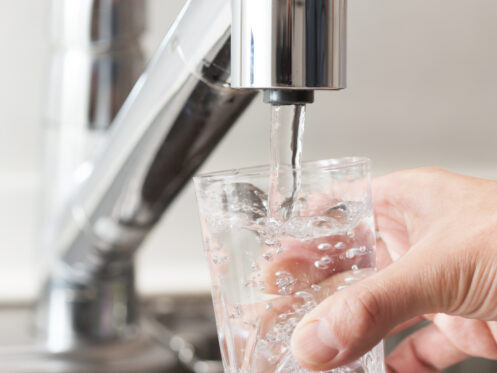Hard water is a common issue that many Indianapolis, IN, homeowners face, and it can be a much bigger problem than many people realize. Homes that have hard water tend to have many more plumbing issues. There may be a need to replace certain appliances more frequently. In this guide, we’ll explain everything you need to know about hard water. This includes what it is, how to know if your water is hard, and what options you have for overcoming hard water issues.
What Is Hard Water?
All fresh water has at least some amount of dissolved calcium, magnesium, and other minerals suspended in it. The concentration of these minerals determines whether the water is considered soft or hard. Water hardness is usually measured by looking at the total concentration of calcium carbonate and is usually expressed in either milligrams per liter (mg/L) or parts per million (PPM). The two measurements can be used interchangeably since they are almost exactly equal.
The United States Geological Survey is the main organization that rates water hardness in the US. They have a scale that rates water from soft to very hard based on the mg/L concentration. This scale considers water with a concentration of calcium carbonate under 60 mg/L as soft. A concentration between 61 and 120 mg/L is moderately hard, 121 to 180 mg/L is hard; and anything above 180 mg/L is very hard.
How to Know If Your Home Has Hard Water Issues
Testing for water hardness is a simple task. There are basic test kits that will almost immediately tell you the total concentration of dissolved calcium carbonate quite accurately. Having a plumbing company perform this test is an easy way to know if your home has hard water so that you can then take steps to overcome this issue if necessary.
Hard water is also a relatively easy problem to spot since it will leave behind some quite telltale signs. Specifically, hard water will leave behind lots of mineral deposits that will slowly and continually start to clog up showerheads and faucets. You will usually see mineral deposits forming around your faucets, and the deposits will also leave spots on glass shower doors. Another obvious sign that your home has hard water is if your dishes may have water spots or look cloudy after coming out of the dishwasher. Hard water will also cause your skin and hair to feel dry after showering. You may never feel like you really get completely clean since hard water prevents soap and shampoo from lathering nearly as much as they normally would.
Another easy way to determine water hardness is simply by where you live. Most of Indiana has very hard water. Some of the areas in the state with the hardest water are South Bend, Bloomington, and Lafayette. The Indianapolis area also has extremely hard water with an average calcium carbonate concentration of around 275 PPM, or mg/L.
Why Hard Water Is Such a Major Concern
Hard water causes many more problems than just drying out your skin and hair. Since it prevents soap and detergent from lathering properly, it will often result in your dishwasher not fully cleaning your dishes. It can also leave your clothes looking somewhat dingy and feeling stiff after washing. The bigger issue is the effect that hard water has on your plumbing system and appliances. This includes items like your dishwasher, washing machine, water heater, coffee maker, and the ice maker in your refrigerator.
The reason that hard water is such a major issue is that it leaves behind lots of mineral deposits that lead to a layer of limescale continually building up over time. Even soft water leaves behind at least some mineral deposits. Hard water will result in much more limescale building up more quickly. Limescale buildup due to hard water is one of the main issues that causes the appliances we just mentioned to fail more quickly or suddenly start leaking. It clogs them up and makes them work harder.
Hard water is an especially big issue for both tank and tankless water heaters, but for slightly different reasons. Tank water heaters always slowly accumulate sediment. This happens because some of the dissolved minerals always precipitate or solidify whenever water is heated. Sediment buildup slowly decreases the effectiveness of a water heater and causes it to use more energy. This happens because the sediment layer ends up absorbing lots of heat and preventing it from flowing out into the water. This leads to the water heater heating much more slowly. Hard water also leads to a water heater tank corroding much more. All the minerals react with the steel tank and start to eat away at it. These issues are why flushing a tank water heater is so important. It removes all the sediment from the unit. Most water heaters only need to be flushed yearly, but it’s always best to flush your unit at least twice a year if you have hard water.
In a tankless water heater, the issue is that hard water causes lots of limescale to build up inside the pipes that coil around the unit’s heat exchanger. This sediment essentially insulates the pipes and prevents the water from absorbing nearly as much heat. As a result, the water will heat up more slowly or may not be able to get as hot as you need it to. This issue is also why tankless water heaters need to be flushed and descaled regularly. This works to remove all the limescale.
Another major issue is that hard water also leads to limescale forming inside pipes. This slowly starts to choke off the pipes so that less water flows and the water pressure is reduced. Limescale buildup inside of your pipes is the biggest concern since the only way to overcome it is to replace the pipes.
How to Overcome Your Home’s Hard Water Issues
The most effective option for overcoming hard water and protecting your plumbing and appliances is to install a traditional water softener. This type of unit works using an ion-exchange process that removes almost all the dissolved mineral molecules in the water and replaces them with a very small amount of sodium. Inside the water softener tank are thousands of small resin beads that are negatively charged. Since most of the dissolved minerals are positively charged, they are naturally attracted to the resin beads and stick to them as the water drains down through the tank. The tank is then occasionally flushed with a brine solution. The sodium ions in the brine are also positively charged and cause the resin beads to let go of all the minerals. They can then be flushed out of the water softener into your sewer system.
There are also brine-free water softeners, sometimes also known as water conditioners. This type of unit can be helpful for preventing issues with mineral deposits and limescale buildup. However, it won’t work as well to overcome issues with the hard water drying out your skin and hair or preventing soap and detergent from lathering properly. This is because this type of unit doesn’t remove the mineral deposits like a traditional water softener does. Instead, it simply adds a harmless chemical to the water that keeps the minerals suspended so that no mineral deposits are left behind and limescale doesn’t form.
As one of the leading plumbing companies in the Indianapolis area, Hope Plumbing is ready to help you overcome your hard water issues. We install water softeners as well as filtration systems, tank and tankless water heaters, sump pumps, and other plumbing fixtures and appliances. We also offer professional leak detection and specialize in all plumbing, drain, and sewer repairs. Contact us today to schedule an appointment.

